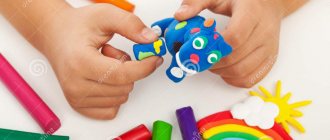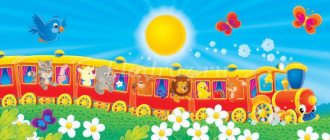Progress of the lesson
At the preparatory stage, a lesson outline is drawn up and the necessary materials are prepared. If necessary, dummies are used. A selection of riddles, fairy tales and musical accompaniment is carried out in advance.
It is necessary to choose the form and methodology of conducting the lesson. For important topics, you can use an open lesson that will be attended by a guest. If parents of preschool children are invited as guests, the children will be more active.
A fairy tale or cartoon is chosen as the basis on which the game will be based. The chosen character should be loved by children and motivate them.
Mini blitz survey to consolidate knowledge
The teacher announces the essence and conditions of the game, passing off the character as the initiator of the game. Distributes necessary items or cards and all props. For example, if preschoolers are learning to count, then they are given counting sticks or other objects for counting. Riddles, stories and poems are designed to help make the task easier. Thanks to them, children will better understand the task.
Sequence of stages of implementation of problem-based learning technology
Important! After the main part, you can do physical exercises accompanied by music. After it, the children will relax and throw out the accumulated tension.
In conclusion, what has been learned is consolidated and the results are summed up. The guys need to say words of praise and emphasize that they are great. You can close the topic with the help of fairy tales, poems, music and songs.
Methodology for conducting GCD in mathematics in early preschool age
An important rule that guarantees results is to conduct classes not only in the kindergarten group. At home, the child must also develop and study with his parents.
Important! After home lessons, the child may want to brag about his successes to his family. In this case, the baby should receive a portion of admiration from praise.
When the first math lesson is held in the second junior group, the children are divided into small teams. This division lasts only a month, then they all study together. This is due to the fact that such an exact science is still quite difficult for children.
Senior groups immediately begin general classes, starting in September. The duration of classes depends on the group. In younger groups, lessons last 15 minutes. The time gradually increases to half an hour in older groups. An event that takes too long, even in its lightest form, will tire even the older guys.
The lessons themselves are held before lunch, when concentration is not greatly reduced. To relax, a subject that requires mental stress alternates with active games or physical exercises.
For your information! The FEMP program is carried out from September to May, then knowledge is supported in a game-based didactic form. There are no classes during the summer.
The volume of study is no more than 1 topic per lesson. The child's brain should not be overloaded. For example, in one lesson a child gets acquainted with the shape of a square, in the next with a circle, and only then a triangle is studied. Classes are held on a weekly basis.
Lesson at home with parents
Techniques for forming mathematical representations
To form ideas, special preparation is carried out. The main technique that is used in almost all activities is play. This is important for a preschooler. In addition, the teacher can use additional methods:
- oral-verbal;
- visual;
- practice.
Methods for diagnosing attention in preschoolers
Methods are selected depending on the end goal or task. Also, when selecting, the characteristics of the group of children are taken into account. The chosen methodology also depends on the topic. Some methods are suitable for some topics, and others are suitable for others. It is common to mix methods. Game methods can be subject-oriented, plot-oriented or follow a script.
Important! The best results come from practice and playful learning. To do this, objects and actions with them are used. Visual memory develops.
The form for submitting assignments can be any. If necessary, the teacher can choose an individual form. An exercise to consolidate knowledge is selected based on the topic being studied. In most cases, group work is used, as it saves the teacher’s time, teaches kids cohesion and the ability to work in a team, which is a positive thing.
When using the game method, tasks should develop mathematical thinking and teach the child to master the data obtained in previous games. Games make it easy to explain space and size, colors, sizes.
It is recommended to reserve the visual method for those cases when you need to explain a topic that is easily demonstrated. For example, the lesson is about length and height. Visually, the child will immediately be able to distinguish long or short, tall or short. Concepts such as “left”, “right” and “center” require mandatory demonstration.
Division into groups
Of the oral methods, the most popular are explanations or instructions. The task is given orally. The child learns to listen to the teacher. Auditory memory and imagination develop. At the same time, information must be presented in portions. If too much is said verbally, the baby will not remember and will lose interest in the process.
To consolidate, one of the verbal forms is used - questions. Only by asking the child and listening to his answer, you can conclude whether he understood the topic or not. This method helps develop speech and communication skills. Each time the preschooler will answer faster and more correctly.
Note! A small quick survey is conducted at the end of each lesson. If the child does not understand, you should have a conversation and convey the necessary information to the child.
Teaching techniques and methods
Mathematics classes in the 2nd junior group should be visual and effective. Children acquire any new knowledge through direct perception, that is, when they follow all the actions of the teacher and themselves repeat the same actions with handout didactic material. The teacher-educator needs to carefully think through each lesson, all new concepts characterizing the subject, first the teacher himself pronounces several times during the lesson and only then asks the children to repeat.
In addition, we must not forget that this age of learning everything new is based on emotional perception. And if you don’t interest your child from the first minutes of the lesson, then it will be in vain. To do this, children's math classes most often begin with surprise moments:
- the appearance of a toy,
- unexpected guests,
- chest with a secret.
The teacher-educator needs to keep the children's attention throughout the entire lesson. To do this, the technique of changing activities is used. The subjects with which the child will work must already be previously familiar to him, otherwise he will first study them the way he needs and will miss all the material offered by the teacher.
The importance of mathematics classes in the younger group
Such classes are also called FEMP. The abbreviation is derived from the first letters of the full name of the process. This completely sounds like the formation of elementary mathematical concepts.
Lesson in kindergarten
According to the Federal State Educational Standard, the 2nd junior group receives FEMP classes for the first time in the garden. With age, the number and duration of classes increase. Mathematical activities stimulate a child's brain activity and intelligence. They also contribute to the development of thinking and memory, and develop a tendency to learn about a subject, for example, why vehicles move.
With it you can gain basic, simple knowledge of mathematics. For example, figure and form, properties and time, length, width and height. To make it interesting for the preschooler, classes are conducted in a playful manner, take a didactic bent, and are intelligently intertwined with leisure time.
For your information! As concomitant successes, the child learns perseverance during classes, patience is cultivated, processes that form imagination and attentiveness are involved.
Studying a subject in younger groups gives great guarantees that the child will do well at school, of course, provided that he is really interested in the classes. Positive achievements provide motivation to further study the subject at school. The absence of pronounced pressure when studying a subject helps the child develop while having fun.
Game form of classes
Tasks and topics for teacher self-education on FEMP in the second junior group
The teacher must be fully proficient in the techniques and methods of FEMP. The piggy bank should contain both gaming and visual, verbal and other techniques. The final summary should include different forms of classes. The information should not be simple, complex or monotonous.
The main topics are:
- skills in using gaming and practical techniques when teaching children;
- orientation towards increasing the level of development of preschool children;
- checking and consolidating what was previously learned;
- analysis of completed work. Preparation of notes, study of literature.
For your information! The teacher must be able to compile a card index, prepare notes and a basis for conducting the lesson. It is required to be aware of all current literature in the field. Both scientific and psychological and pedagogical methods are used.
One way or another, the full formation of elementary mathematical concepts is impossible without the participation of parents. Only the joint work of the kindergarten staff and mom and dad will have an effect and will serve as the key to the child’s future success.

